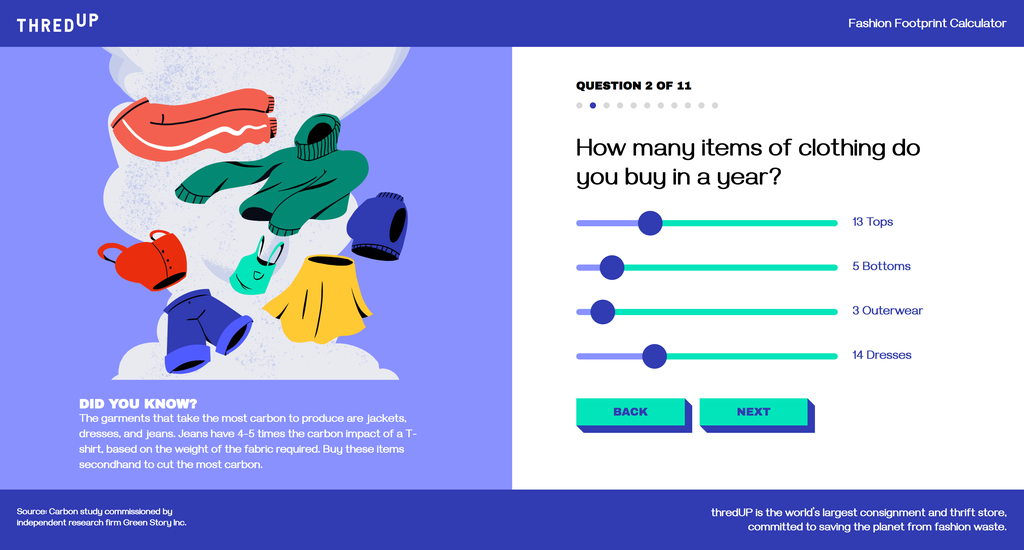
If you’re feeling overwhelmed by the climate crisis, and unsure how to make a real impact, we have some good news. Yesterday, Emma Watson announced a new partnership with thredUP, an online consignment and thrift store that is officially doing more than reselling clothes: It now has a tool that calculates just how much your fashion habits impact the environment, based on what’s in your closet.
Watson shared the news in an Instagram post, saying, “Our closets impact the planet and climate more than you might realize, which is why I am proud to partner with @thredUP to launch their new Fashion Footprint Calculator (link in bio!) They created an easy to use tool, and I’m so excited to help people discover the carbon impact of their wardrobes, and steps you can take to lighten your fashion footprint.”
ThredUP’s new Fashion Footprint Calculator asks users a series of questions about the way they shop, including how they buy clothes (and whether they buy sustainable brands); how they clean their clothes (both laundry and dry cleaning); if they rent their clothing; and how often they return stuff. The tool then calculates the annual carbon footprint of the user’s closet. It also shares the best ways to reduce that footprint, with explanations about how these actions make a direct impact. There’s even an “Eco-directory” that promotes sustainable brands, and “green” shopping discounts.

According to thredUP, who has partnered with eco-friendly companies including Rent The Runway and Grove Collaborative, the average consumer contributes approximately 1620 pounds of CO2 per year. By launching this helpful function, the company hopes to educate and empower shoppers to work towards reducing their environmental impact. After all, knowledge is power.
“While it’s universally known that fashion pollution is a problem, we were surprised to find that most consumers don’t think their individual clothing choices matter. The reality is, to change course, both brands and consumers need to take action and make positive changes,” Erin Wallace, thredUP’s VP of Integrated Marketing, said in a Medium post explaining the new tool. “We know most consumers want to do better, but aren’t sure how. thredUP’s Fashion Footprint Calculator aims to show how each one of us can play a role in reducing the carbon footprint of our individual closets to collectively create a more sustainable fashion future. The more we understand the impact of our fashion choices, the easier it is to make smart decisions.”
Regarding the company’s efforts, Watson shared on Instagram, “I love their mission to inspire us to think secondhand first and create a more circular fashion future.” The calculator is just one of the company’s many initiatives to educate its consumers. Every year since 2013 the company has released annual reports about the resale market and how it’s shifting; this year thredUP discovered that the secondhand market will reach $51B in five years, while the resale market has grown 21 times faster than the retail apparel market over the last three years. While shopping secondhand is infinitely better than buying new clothes, the most sustainable thing you can do is rewear the stuff you already own.
Like what you see? How about some more R29 goodness, right here?
Is Resale The Future of Sustainable Fashion?

No comments:
Post a Comment